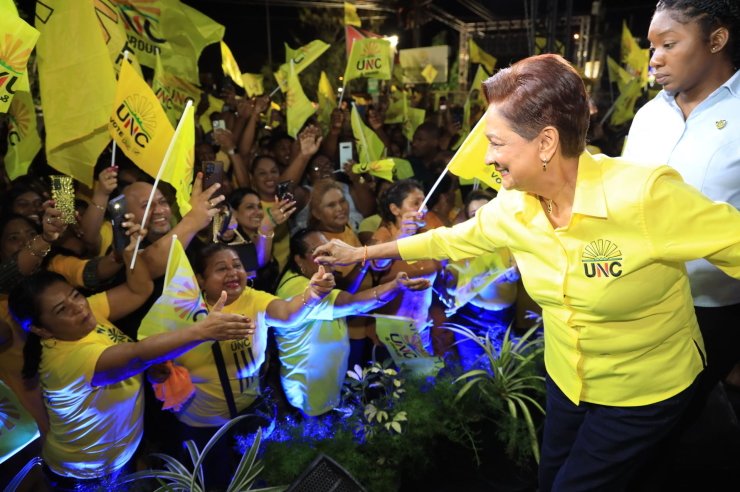In a stunning turn of events, the United National Congress (UNC) has claimed a decisive victory in Trinidad and Tobago’s 2025 General Election, securing a commanding 26 seats in the 13th Parliament. The preliminary results signify a political earthquake, with the People’s National Movement (PNM) reduced to 13 seats, and the newly ascendant Tobago People’s Party (TPP) clinching both seats in Tobago.
The outcome signals a decisive shift in the political landscape, reminiscent of the 2010 general election when the then-UNC-led People’s Partnership won 29 seats against the PNM’s 12. With a constitutional majority, the UNC can now govern without coalition support — a rare and powerful mandate from the electorate.
Kamla Persad-Bissessar, who became the country’s first female Prime Minister in 2010, has returned triumphantly to office for a second term. In her victory speech in Chaguanas, she declared, “When God says yes, nobody can say no.” Echoing the UNC’s campaign message, she told jubilant supporters, “Now that the UNC has won, everybody wins.”
She signaled an immediate pivot to governance, promising that her new administration would waste no time delivering on its commitments. “After years we spent listening to you—your wants, your needs, your hopes and your desires — it is now that the real work starts,” she said.

The PNM, meanwhile, faces a dramatic setback. Not only did it lose control of the government, but it was also completely ousted from Tobago, ending a 25-year political stronghold. The Tobago People’s Party, led by Farley Augustine, made history by sweeping both seats, a development widely viewed as a significant shift in the island’s political autonomy and identity.

Stuart Young, who recently took on the role of Prime Minister after Dr. Keith Rowley’s departure, now holds the record for the shortest tenure in the nation’s history—just over one month.

Key national institutions’ reactions were swift. The Trinidad and Tobago Coalition of Services Industries (TTCSI) congratulated the UNC on its campaign efforts and commitment to national development. The organization also praised Farley Augustine’s leadership and described the TPP’s breakthrough as a “significant development” for Tobago.
The TTCSI reaffirmed its readiness to collaborate with the new administration to enhance Trinidad and Tobago’s services sector and called for bipartisan cooperation in tackling national challenges.
The Energy Chamber of Trinidad and Tobago echoed these sentiments, congratulating Persad-Bissessar and the UNC. Representing over 400 member companies, the Chamber emphasized its commitment to partnering with the new government to build a resilient and forward-looking energy sector that provides long-term value for the country’s citizens.
With the dust now settling on an election that has redefined the political order, all eyes turn to Kamla Persad-Bissessar’s incoming government—and the promises it must now fulfill under the weight of an immense national mandate.
Today, the Caricom countries have three Indian leaders: Dr. Irfaan Ali, President of Guyana; Mr. Chan Santokhi, President of Suriname; and Mrs. Kamla Persad Bissessar, Prime Minister of Trinidad and Tobago.





